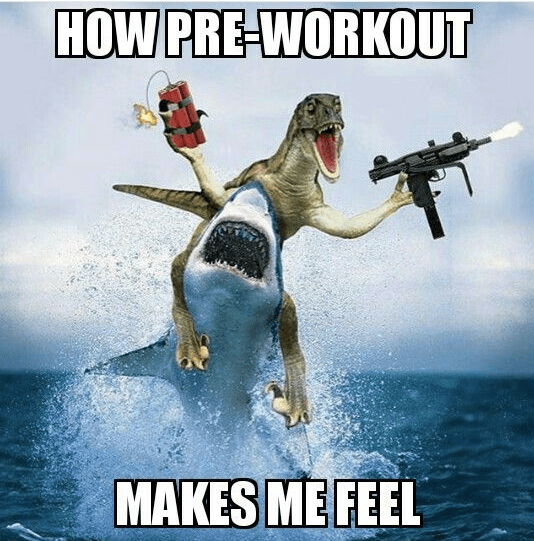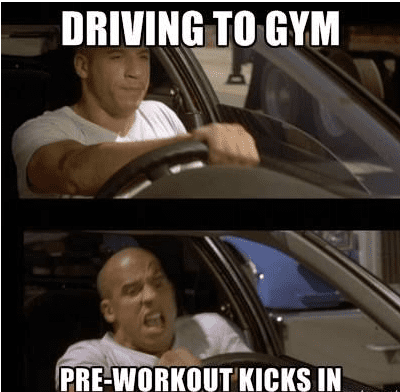What Do The Ingredients In Your Pre-Workout Do?
Last updated: May 20, 2020
Reading time: 6 minutes

Pre-Workout can make you feel pretty gnarly – an amped up gnarly, gimme a sec I have to poo gnarly, or a combination of both.
With the help of Andrea Hardy, RD, I wanted to talk about some of the common ingredients in pre-workout supplements and what they do.
Caffeine
This is one of my recommended supplements. During high intensity exercise caffeine can improve performance and stamina. The average male requires ~200-400 mg of caffeine to improve performance, you want about 5mg/kg body weight for an efficacious dose. This can be a lot of caffeine.
Something to consider: will it affect your sleep quality, how does it impact your stress levels, and really and truly, how much does it improve your performance?
Andrea’s Advice: use sparingly, experiment with smaller doses to start, and titrate up. Always test before a big event – don’t just decide on race day you’re going to take 400 mg of caffeine – otherwise the only place you’ll be racing is to the bathroom. My philosophy is similar to Mike’s – use it on an as-needed basis.
Creatine
This is also one of my recommended supplements. Creatine is a naturally occurring compound in the body that helps with energy metabolism. Research shows that it can help improve sports performance and improve your capacity to train. It is also associated with protein muscle synthesis. It’s quite safe, especially in doses recommended for sport.
Andrea’s Advice: out of all the supplements, alongside caffeine, I feel the evidence is the strongest for this one. It is also least likely to have negative effects on the body.
Nitrates & Nitric Oxide
Despite some studies looking hopeful in this area, well designed, placebo controlled, crossover trials (read: good quality studies) have been really underwhelming. Product endorsers claim that products with Nitrates and Nitric Oxide help improve exercise performance, reduces O2 cost of exercise, and reduces resting blood pressure. However, long-term studies are lacking and there is potential toxicity from large doses. People claim to take it for the ‘pump’ in weight training – however there is no evidence to support that it actually improves blood flow or vasodilation. The body is a finely tuned machine and likely compensates for oral ingestion of nitric oxide.
Things to consider: Cost, Gastrointestinal sensitivities & Issues. I used to use N.O. Xplode, a pre-workout that has nitric oxide, it should be more appropriately be called N.O.-make-your-butt-Xplode, because, yeah, because of that.
Andrea’s Advice: I tried Beet juice once – guys – it made me feel awful. The concentrated juice, plus high intensity exercise gave me a serious stomach ache. I’d pass on this poorly proven supplement. If you want someone to help lighten your wallet, Mike and I are taking donations to our vacation funds. I kid – but really – where is your money going when you spend on pre-workout supplements? Often times, pre-workout supplements on the market are untested, unproven, and often have very little impact on your performance.

Beta-alanine
Wonder why your pre-workout makes you tingle? It’s the beta-alanine. Beta-alanine is an amino acid that has been shown to potentially be beneficial in exercise performance for high intensity, short duration exercise; supplementation results in higher skeletal muscle carnosine, an intracellular buffer. Typically, most of the studies have found the biggest impact in the first ~4 minutes of exercise. For the average exerciser, the split second difference in high intensity exercise performance is not likely worth it – or even going to be noticeable for you. For the Olympic or professional athlete? Maybe. However, there is limited research that suggests it may offer benefits in high-intensity anaerobic performance: greater than 1 min, less than 5 min, delays onset of neuromuscular fatigue, increased time to exhaustion (no change in VO2 max or max strength).
Andrea’s Advice: Though beta-alanine is not likely to cause harm, this is one I would skip. For the average person those minute differences are not likely to make an impact on overall health, and therefore the risks outweigh the benefits.
L-carnitine
L-carnitine is a vitamin-like compound with well-established functions in intermediary metabolism. L-carnitine is vital to normal metabolism; the liver and kidneys synthesize L-carnitine from methionine and lysine. L-carnitine is found mostly in meat and dairy products.
Claim: L-carnitine acts as a vasodilator in peripheral tissues, which may enhance regional blood flow and oxygen delivery; might improve oxygen supply to injured tissue and promote clearance of muscle damage byproducts, thus reducing DOMS. L-carnitine is involved in the transfer of LCFA (Long Chain Fatty Acid) across the mitochondrial membrane. Theory is that supplementing with L-carnitine could enhance FA (Fatty acid) oxidation in athletes.
There is no substantial evidence to support this theory; even so, supplements are widely sold.
Hydroxycitrate (HCA)
A principal constituent of the rind of the fruit of Garcinia cambogia use in Asian cuisine. Appears as an ingredient in multiple different products such as the No-diet diet, Bio Max 3000, PhytriMax, Lite Bites, Garcinia, TrimePlus, GarciniaeMax, Diet+System, Citrilite, Citrichrome, Lipotrol, MicroSlim, Body+Busters, and Super Prolean Mega Fat Burner.
Claim: “natural fat burner” that facilitates weight loss, touted generally as being able to enhance endurance performance.
Research findings indicate that increasing plasma HCA availability with supplementation exerts no effect on skeletal muscle fat oxidation during rest or exercise. In other words, it does nothing.
There are ingredients in your pre-workout that aren’t listed above, we chose to stick to the mainstream ingredients.
I used to take pre-workout quite often, despite being aware of how it might be ineffective, because it was a psychological commitment for me.
My advice now: skip the pre-workout, or don’t use it regularly. Have a black coffee and do this instead.
Also, be weary of any health professionals that push you towards products that don’t have good scientific basis for taking them; more often than not they are trying to make a buck off of you.
I’ll let Andrea have the last word on this one.
Andrea: A good rule of thumb: the average person does NOT require pre-workout supplements. However, if you do choose to take supplements that choice is up to you; be informed and if you’ve reached this point in the post then you are doing your due diligence to be informed so good on ya.
The supplements that exist on the market that are of high quality may alter how you perceive your performance during a workout, however, very few substances are proven to help in the ways many supplements claim, or have modest to negligible evidence to support them.
Fun fact: I used to work as an ICU dietitian, and it was ALARMING how many people would come in with liver failure, heart failure, or kidney failure due to taking supplements that contain dangerous ingredients that WEREN’T labelled, purchased online, and weren’t certified by third party certification. Because these supplements are poorly regulated, they can often contain dangerous ingredients. Is it REALLY worth your health to perceive that you feel a bit better during a workout? No. A thousand times no.
It’s the wild west when it comes to supplements out there. The industry is poorly regulated. Bottom line is your safety. Supplements should:
- Be tested for banned ingredients
- The dosages should be based on research
- List individual ingredients – proprietary blends are often NOT tested, are poorly controlled/regulated, and aren’t using best practice to listing ingredients for safety
- Contain a 3rd party certification – like NSF, BSCG, and informed choice to be tested for safety and meet these above standards. These certifications check the supplement for banned substances – it doesn’t mean it works or the supplement is evidence based – BUT! It ensures a supplement lists ingredients in amounts, and that it doesn’t contain any dangerous or banned ingredients.
So – are you still gunning to take a pre-workout supplement? We’ve given you what the research and evidence says, you decide.
